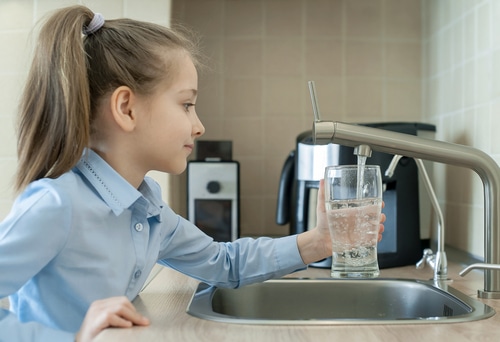Understanding Hard vs. Soft Water
Water is considered “hard” when it contains high levels of minerals, primarily calcium and magnesium. These minerals can cause a variety of issues in your home, from damaging appliances to affecting the quality of your skin and hair. Soft water, on the other hand, has been treated to remove these hardness minerals, resulting in water that’s easier on your plumbing and better for daily use.
How a Water Softener Treats Hard Water
A water softener uses a process known as ion exchange to remove calcium and magnesium ions from hard water. The system contains resin beads that attract and hold onto these hardness minerals, exchanging them for sodium or potassium ions. As a result, the water that flows into your home is softened, meaning it’s free from the minerals that cause scale buildup and other common hard water problems.
Health and Home Benefits of Soft Water
Softened water offers numerous benefits, including:
- Protecting Appliances and Plumbing: Soft water prevents mineral buildup in pipes and appliances, extending their lifespan and improving efficiency.
- Improved Skin and Hair: Hard water can dry out skin and hair, whereas soft water is gentler, making it ideal for daily bathing and skincare.
- Reduced Soap and Detergent Use: Soft water allows soaps and detergents to lather more easily, which means you can use less and still achieve the same cleaning results.
Why Puronics Water Softeners Stand Out
Puronics water softeners are designed to provide consistent and reliable performance, with features that make water softening more effective and convenient. Some of the advantages of using a Puronics system include:
- Advanced Filtration Technology: Puronics water softeners incorporate advanced filtration to improve water quality beyond just softening, addressing common impurities for a healthier water supply.
- Efficient Regeneration Cycles: Puronics systems are engineered for minimal water and salt usage, reducing waste and operating costs over time.
- Durability and Longevity: Built with high-quality materials, Puronics water softeners are designed to last, offering long-term reliability for your household.
Common Myths About Water Softeners
There are a few misconceptions about water softeners that can cause confusion:
- Myth: Soft Water Isn’t Safe to Drink: Many people believe that softened water has too much sodium, but in reality, the added sodium level is minimal. Puronics systems are also customizable to meet specific water quality needs.
- Myth: Soft Water Feels Slimy: Soft water may feel different to those used to hard water, but it actually provides a cleaner rinse, leaving no residue or film on skin.



